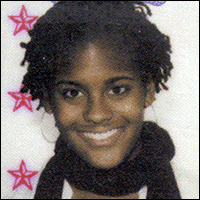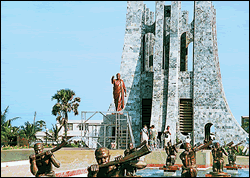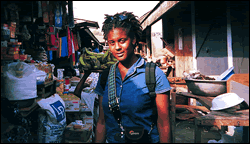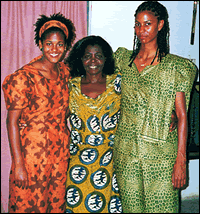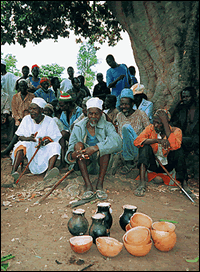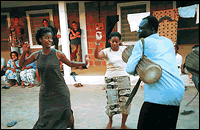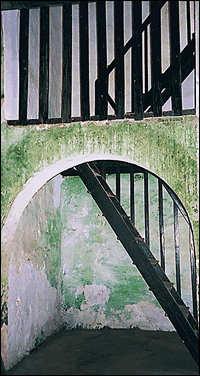 |
 |
 |
 |
|
COVER
STORY
Dani McClain '00 spent the Spring '99 semester studying in an African Diaspora program based in Cape Coast, Ghana. This program, coordinated by the School for International Training in Brattleboro, Vt., takes a multi-disciplinary approach to educating American students on the history of the trans-Atlantic slave trade, issues of public memory and Ghanaian culture in general. A history major with an interest in early twentieth century U.S. social history, McClain was drawn to the Diaspora program by a desire to step outside the Western focus that had characterized her experience at Columbia. More importantly, she was and remains intrigued by the political economy of the slave trade, West African literature written in the period of colonialism, and the memoirs of Americans of African descent drawn to Kwame Nkrumah's Ghana in the late 1950s and early 1960s. The Republic of Ghana covers 92,098 square miles in western Africa, with a population of 17,748,400, according to 1996 estimates. Once known as the Gold Coast, it declared its independence from Great Britain in 1957 and became a republic in 1960. McClain, a native of Cincinnati, has served as political chair of the United Students of Color Council and is currently editor-in-chief of Roots and Culture, a campus literary magazine. A former work-study student at Columbia College Today who has written for the magazine in the past, she is currently a researcher for a three-part public television documentary on the history of Harlem in the twentieth century. It never occurred to me that New York could seem provincial. But as I absorb Morningside Heights in all its bustling glory, something crucial registers: Not only is this the last time I will experience this campus through the eyes of a Columbia undergraduate, but I have changed so much in my time here that this place seems suspect in its manageability. Broadway stretches out before me as it has for the past three years. Most, if not all, of the conveniences and diversions a college student could want line this street. Many of the opportunities I hoped for as an anxious high school student in the Midwest are easily accessible. And yet all of this now seems less frenetically urgent, less wildly expansive. This neighborhood's gleam has diminished since I took it all in for the first time. Some of this restlessness is the inevitable awareness that it's time to move on. Many students experience wistful boredom as they reach their final year of college. But much of this sense that I am on the brink of stagnation stems from a different source. Ghana has done this to me. I need to make sense of what I have seen during my 312 months spent in West Africa. I have been exposed to realities that I haven't yet discovered how to integrate into my life, a life that Columbia has shaped, for better or for worse, in recent years. Sincerely curious friends and acquaintances ask me about my time abroad: "How was it?" They appear stung when I respond (in tone if not explicitly), "Ghana was dungeons in slave castles that still emit the odor of the imprisoned awaiting transatlantic sail as human cargo," or "Ghana was the tactfully articulated bitterness of labor leaders and farmers as they spoke about the realities of structural adjustment as imposed by the IMF and World Bank." My friends and family want simply put, positive summaries of my experience. I can't offer any.
I arrived in Ghana's capital, Accra, on January 31, 1999, as a participant in an African Diaspora Studies program. As a student of American history whose academic interests have centered on the experience of people of African descent in the United States, I saw the Diaspora Studies program as an ideal way to spend the second semester of my junior year. I felt I had a good grasp on the African-American historical narrative, but I needed to go to the origin. I needed to know Africa beyond The New York Times's headlines about political corruption and economic underdevelopment. I needed to see living proof that centuries ago, people had resisted being stolen away. I needed to know what these people thought of me as a descendant of those who hadn't been able to resist. Accra is Ghana's metropole, home to the vast majority of the country's capital, its wealthy government officials and its premier university. Multi-lane highways wrap around Tetteh Quarshie and Nkrumah Circles, and BMWs and cell phones are often seen on the streets and sidewalks of the city. Accra symbolizes Ghana in the post-independence era. The Kwame Nkrumah monument and the home of expatriate W. E. B. Dubois loom large on the list of must-see Accra attractions. It is a city that takes the word "modernization" very seriously and sees in its own reflection the chance to prove that Ghana has attained the ambiguous goals outlined by the concept. The day after my arrival, I traveled, along with the 21 other students in my program, from Accra to Cape Coast. Approximately 120 km. to the west of the capital, Cape Coast is smaller and emanates a kind of historical vibrance that Accra lacks. It is home to several top-notch private schools established under the British colonial state, and is known historically as the capital of West African secondary education. The presence of schools like Wesley Girls, Mfantsipim and Holy Child contributes to a sense of cultural pride. Academic competitions between the schools are broadcast on GTV (Ghana Television, one of the country's two local stations) and are watched with almost as much enthusiasm as football matches.
Cape Coast proper spreads out from the bustling market, Kotokraba, where vendors sit in stalls containing stacks of cloth, lumps of pungent shea butter, plastic sandals, sacks of rice, a myriad of goods. The reek of blood and sea salt hangs in the air around the market and carries out to the dirt roads that separate it from the rest of the crowded downtown area. Highlife music bounces its drum machine rhythms and catchy melodies out of the tailors' stalls and chop shops (small restaurants) that fill the city. Women balancing tin bowls of yams or pineapples on their heads dodge children clad in the orange shirts and brown shorts common to all students. The city fades on its southern side into rocky shoreline and finally the Atlantic. I moved to Pedu, a suburb of Cape Coast, to live with the Stephens family, after spending a week in a hostel on the outskirts of the city. I liked my host mother the moment I met her. Rebecca Stephens was a woman of 50 years who looked to be in her mid-30s. She ran a batik store out of her home, in a room adjacent to the guest wing, and I soon got used to the incomprehensible babble of voices, potential buyers and friends trailing in and out of the shop from early morning till evening. Her store served not only as a setting for business transactions, but more importantly as a place where neighborhood women met, usually late in the afternoon, to talk over the occurrences of the day and their expectations for the next. I was surprised by the spaciousness and generally western character of the house in which I was to live for the next two months. The large and carefully decorated living room contained several couches ("bought," Professor Charles Stephens told me proudly, "over 20 years ago in Canada"), framed family photographs, and a television that was almost always tuned either to CNN or to early 1980s reruns of The Bold and the Beautiful and Days of Our Lives. The living room opened onto Professor and Mrs. Stephens' wing, their bedroom and bath; and what had previously been their daughters' and was now to be my wing, two bedrooms and a bathroom. What had been the "boys' quarters" were located outside, adjacent to the garage. None of the four Stephens children still lived at home. I was supposedly a dead ringer for Jocelyn, the eldest, who was born in Canada and now lives there with her husband and two children. Yvonne was in her mid-20s and studying computer science in Maryland. The elder son, Ato, was finishing up his studies at the University of Ghana just outside Accra, and the younger son, Ebow, was at a private boarding school, also in Accra.
After having spent some time in Accra and outside Cape Coast before moving in with the Stephens, I knew I was not living with the typical Ghanaian family. The School for International Training placed all students in middle to upper class homes that would not offer too much of a departure from average American living standards. My own bathroom had a shower and sink that ran cold but reliably, and a toilet that flushed-conveniences I took for granted, but later recognized as luxuries after I moved out to live on my own for a month in the fishing village of Komenda. My host father was a professor of botany at the University of Cape Coast. He received his B.S. at the University of London, his M.A. at the University of Ghana and his Ph.D. in Canada. The cosmopolitan character of his education placed him within that elite layer of Ghanaian society that is both alienated from and somehow generally esteemed by the majority of Ghanaians. While I consider myself to be somewhat attuned to the glaring ways in which income inequality presents itself in the United States, I never really got used to class disparity in the Ghanaian context. The image of two bloated-bellied children using a garbage heap as a toilet, as a professional-looking man drove past in an expensive car, was one I encountered and found to be not entirely uncommon. That particular incident took place in Accra, but the contrast between the haves and have-nots was no less apparent in Cape Coast or any of the coastal, urban areas. Upon our first meeting, Professor Stephens asked me two questions. First, he was very curious to know how my impressions of Ghana contradicted my previously held expectations. I could see that my insistence that I hadn't been there long enough to make a proper assessment made him a little wary, perhaps implying to him I was to be an evasive and contrary house guest. Then he wanted to know whether I had ever killed and prepared a chicken, because he wanted to buy one for me the next day. Upon hearing that I don't cook, he looked even more dissatisfied. I tried to redeem myself by taking part in a long and fairly superficial conversation on Angela Davis and black American radicalism in the 1970s, a topic about which he appeared very excited. He concluded at conversation's end that I had proven myself to be "a very smart girl," but how did I expect to get a husband if I didn't cook?
Questions like this one met me throughout my stay in Ghana. They increased in frequency after I finished my course work at the University of Cape Coast and moved to Komenda to undertake a study on the effects of structural adjustment on Ghana's agricultural sector. The men and women I came in contact with, mostly farmers, market vendors and fishermen, were often unable to comprehend how I, an unmarried woman of 20, could be 5,000 miles away from any kind of familial supervision, doing something as nebulous as "research." That I fell outside fairly strict prescriptions for how an unmarried woman should conduct herself made my stay in Komenda isolating in many ways; people were much less open to the idea of foreigners than they had been in Cape Coast or Accra. Luckily, I became friends with the family of Patrick Mensah, a resident of the neighboring village, Kissi, and an agricultural consultant who agreed to be interviewed for my research. In both its rural and urban areas, Ghana was an endless stream of sensory stimuli. I spent my first weeks there becoming accustomed to the smell of jollof rice cooking in my host family's kitchen, the layers of conversations and endless jostling characteristic of the ever-crowded tro-tros (privately owned and operated vans which serve as public transportation), the texture of the boiled plantain and cassava which when pounded together become fufu (the basis, along with various soups, of the Ghanaian diet), the brightly colored and intricately patterned yards of cloth from which Ghanaian women cut their long straight skirts and full-sleeved tunics. I was a sponge. I wanted to memorize every detail with which I was presented. But I was captivated in the same way as is one watching a presentation on stage or screen. Despite efforts to pick up key phrases in the Fante language and to appear less conspicuous by wearing the full-cut outfits my host-mother sold me from her batik shop, I remained further isolated from the culture than I would have expected. I did not fall victim to the frequent misconception on the part of West Indians and African-Americans that we will be welcomed to the continent as some sort of long-lost prodigal sons and daughters. But as a person of African descent, I had gone to Ghana with the expectation that I would be seen at least as something of a distant cousin, several times and thousands of miles removed. Nothing could have prepared me for the shock I experienced when, walking through the aisles of the Kotokraba market in Cape Coast, I heard someone behind me shouting repeatedly, "White lady! White lady!" Expecting to see some type of drama unfolding at a nearby vendor's booth, I turned to realize that the white lady whose attention was so urgently being sought was me. Books like Maya Angelou's All God's Children Need Traveling Shoes and Leslie Alexander Lacy's The Rise and Fall of a Proper Negro had filled me with images of Ghana that I had somehow forgotten to place in the historical context of the late 1950s and early 1960s. I had (naively) expected the politically charged Ghana of the Nkrumah era, when to be a diasporan in that country meant to be welcomed by many as an ally in the struggle of Pan-African and socialist unity against Western economic, political and cultural domination; at least such was the prevalent ideology of the time.
Today, Tommy Hilfiger designs are must-have items and hip-hop beats pound in cars in Accra just like they do in Urban Anywhere, USA. Images of Bill Clinton clasping hands with a smiling President Jerry Rawlings covered the front pages of newspapers soon after my arrival, testament both to the Clintons' recent visit to Accra and to Rawlings's accommodating stance on the issue of increased foreign investment. The resistance to Western cultural and political imperialism that was characteristic of the immediate post-Independence era has been deemed irrelevant by the circumstances of the present. A brief and very general word on recent politics in Ghana: In 1992 a national referendum led to the adoption of a new constitution. Rawlings was elected president of the Fourth Republic of Ghana, retaining the power he had previously seized on December 31, 1981, when he had led his second coup against the state in three years. The government has been relatively stable for the past seven years. However, it is under constant attack from civil society for its neglect of social services in favor of achieving economic restructuring as mandated by the IMF and World Bank. Unemployment, wage freezes and currency devaluation are commonplace, and the removal of subsidies on health care, education, housing, water, electricity and telecommunications has rendered the majority of the population without access to basic necessities. In an interview with journalist Bill Moyers in 1988, Nigerian novelist Chinua Achebe responded to the question, "How would you like for us (people in the United States) to see Africa?" as follows:
I read the interview from which that quotation is taken soon after I returned from Ghana. In the wake of my experience, I wondered from a newly found perspective about racial chauvinism as frequently found in Western "enlightened" thought in the context of my experience at Columbia. More specifically, I thought both about the content of Contemporary Civilization and debates in which I have been involved about the viability of a Core Curriculum that focuses on the western world. I was reminded of the cursory discussion of Dubois's The Souls of Black Folk as compared with the enthusiasm with which we were encouraged to read and engage with Apuleius, Mill or Adam Smith. I was reminded of the days some of my classmates' prejudices, usually suppressed for the sake of avoiding unpleasant confrontation, surfaced through discussions of de Sepulveda and de las Casas, Gobineau and Darwin. I was reminded of why CC is priceless as a forum for critical discussions on the merit of a political philosophy that privileges concepts of empire, industrial advancement and economic efficiency over humanitarian concerns. In Ghana, I was able to supplement my education in extremely important ways. I can read about the hypocrisy inherent in the European attempt to convert Africans to Christianity in a history or anthropology class at Columbia.
In Ghana, I saw the paradoxical evidence for myself, standing in the courtyard of the Dutch-built Elmina Castle (which has at different points in history held some of the region's most important natural resources: its gold and its people) and looking at the sign over the chapel door that reads, "First Church in Ghana." I traveled to the northern part of the country and met with the elders of the village of Sankana, famous for its seemingly impenetrable caves where centuries ago people hid themselves in attempts to escape the slave raids that served as constant threat. I was surrounded by people who encouraged me to read poets like David Diop and Kwesi Brew, novelists like Sembene Ousmane and Ayi Kwei Armah, and political theorists like Kwame Nkrumah and Sekou Toure. All of this not in fulfillment of a Major Cultures requirement that has been added to the original Core courses, but as fundamental to my education, as crucial to my understanding of a people with a culture and history which is in no way primitive or rudimentary, but complex and extremely important to my understanding of myself. During my senior year in high school, I received an award from the alumni association of a prestigious liberal arts college that was actively recruiting me at the time. In presenting the award, a local alumnus, who I happened to know quite well, said to the audience of students, teachers and administrators gathered in the auditorium of my predominately white high school, "Dani will enable us all to build a stronger bridge of understanding and enlightenment between our [white] culture and the rich African-American tradition." I recently
found the paper on which the alumnus had written his speech folded
and wedged between the pages of the book I was given that day.
After marveling bitterly at the fact that my psyche had remained
relatively intact after 13 years in a school district in which "our
culture" obviously was considered synonymous with "white culture,"
I realized yet another reason why my time in West Africa was
significant. For the first time in my life I didn't have the burden
of acting as the carrier of insights into the "black experience" to
the white world, in exchange for the opportunity to speak. Ghana
was freedom from the obligation to be that cultural bridge. Ghana
meant being motivated to learn strictly by desire, and not by a
feeling that knowledge can be a weapon and it is always best to be
armed. Ghana was all these things. No wonder New York seems
provincial in comparison. |
|
|||||||||||||||||||||||||||||||||||||||||||||||||||||||
